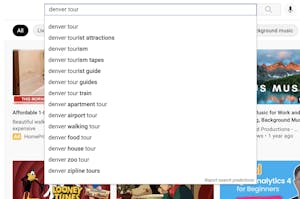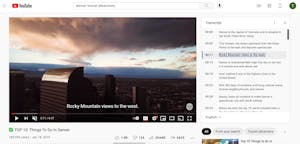- 5 minutes
- Digital Marketing
- Social Media
All Skill Levels
Get a behind-the-scenes-look into FareHarbor's 2024 season

Is SEO for YouTube really relevant? You bet it is! Apart from being an opportunity to showcase your brand, videos that rank well on YouTube get more views and more exposure for your business.
YouTube is the second-largest search engine in the world, with more than 3 billion monthly searches.
Whether you want to attract viewers on YouTube or are just using the platform to host videos to embed on your website or share on social media, you can benefit from optimizing your video content for SEO. As you read these tips, you’ll probably notice that YouTube SEO follows almost all the same best practices as regular SEO, so you already have a leg up! Before you dig in, don’t forget to view this guide on customizing and optimizing your channel.
First things first: If you want your YouTube videos to rank well, they need to be worth watching! One of the most impactful ranking factors on the platform is audience retention, meaning how many viewers watch until the end of your videos. According to YouTube, “videos with consistently high audience retention and watch time have the potential to show up more frequently in Search and Suggested locations on YouTube.”
Of course, making captivating videos takes practice, and you’re unlikely to become a YouTube sensation overnight. Here are a few tips to keep viewers entertained all the way through your videos.

Get more video tips and inspiration in this guide.
You’re probably familiar with keyword research for SEO. You can apply the same principles to YouTube keywords. One option is to begin your keyword research by using paid tools like YTCockpit and vidIQ to search keywords and analyze search volume and relevance.
For a simpler (and more cost effective!) approach, head to the YouTube search bar and start typing in keywords relevant to your industry or the specific video you had in mind. Just like when you conduct this type of research in Google, you’ll see a list of keyword suggestions related to your search that can offer great inspiration as you plan your video content. Play around with the keyword variations and keep a list of your favorites.

Another great keyword tool is the free Google Trends YouTube Search option. It lets you compare keywords to see which ones appear in more searches and rank higher. Just remember that keywords with high search volume are often harder to rank for. Try to prioritize relevance over search volume.
If you begin keyword research before filming the video, you have the opportunity to say the keyword on camera. Why does this matter? When you publish the video, YouTube automatically makes a script, and your target keyword gets included.
 Pro tip: Just like writing a blog or tour description, you want to avoid keyword stuffing. Don’t say your target keyword too many times in the video. Viewers will notice how unnatural it sounds and won’t want to engage with your channel.
Pro tip: Just like writing a blog or tour description, you want to avoid keyword stuffing. Don’t say your target keyword too many times in the video. Viewers will notice how unnatural it sounds and won’t want to engage with your channel.
When you implement keywords on a web page or in a blog post, you don’t just use them in the body text. You also add them to the page’s meta data and subheadings. You should do the same thing with YouTube videos!
Add your keyword in the video file name, title, video description, transcript, and video tags. This will help your video appear in searches for the given keyword.

Do your competitors have a YouTube presence? Head over to their channel and filter their most popular videos to get an idea of what really resonated with their target audience. Figure out which keywords they targeted in these videos and determine how you can make an even better video with the same target keywords.
Comments are important! They measure how engaged your audience is with your videos. It’s always smart to end your videos by asking people to comment. But beyond just telling them to do so, inspire them by asking them to share their opinion on the subject. 
For instance, ask them to share any travel tips they have or what they would do differently. The more specific you get, the more likely your video will receive comments. Not to mention, there’s a good chance the comments could include your target keyword.
 Pro tip: Just like responding to reviews is a must, it’s essential to respond to YouTube comments in order to boost engagement. Thank viewers for watching, offer additional information from what you covered in the video, or ask them a follow-up question about their comment.
Pro tip: Just like responding to reviews is a must, it’s essential to respond to YouTube comments in order to boost engagement. Thank viewers for watching, offer additional information from what you covered in the video, or ask them a follow-up question about their comment.
Take your YouTube videos to the next level with these helpful tips that will improve your chances of showing up on YouTube Search. Cover your bases with our YouTube optimization checklist.